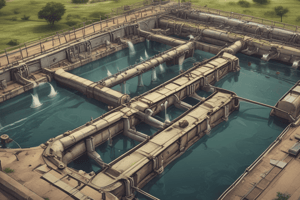Podcast
Questions and Answers
What is the primary goal of secondary treatment in wastewater management?
What is the primary goal of secondary treatment in wastewater management?
- Minimize odors
- Separate large debris
- Remove solid particles
- Break down organic materials (correct)
Which of the following is NOT a common method used in secondary treatment of wastewater?
Which of the following is NOT a common method used in secondary treatment of wastewater?
- Activated sludge systems
- Biological processes
- Trickling filters
- Mechanical filtering (correct)
What is the main purpose of primary treatment in the wastewater management process?
What is the main purpose of primary treatment in the wastewater management process?
- Minimize odors
- Separate solid particles from the liquid portion (correct)
- Break down organic matter
- Reduce the volume of wastewater
Which stage of water treatment involves removing large debris such as leaves, twigs, and sand?
Which stage of water treatment involves removing large debris such as leaves, twigs, and sand?
What role do microorganisms like bacteria and fungi play in the wastewater treatment process?
What role do microorganisms like bacteria and fungi play in the wastewater treatment process?
What is the primary difference between activated sludge treatment and trickling filters?
What is the primary difference between activated sludge treatment and trickling filters?
Which of the following is NOT typically considered an advanced technique used in tertiary treatment of wastewater?
Which of the following is NOT typically considered an advanced technique used in tertiary treatment of wastewater?
What is a critical component of tertiary treatment focused on eliminating pathogens from wastewater?
What is a critical component of tertiary treatment focused on eliminating pathogens from wastewater?
What is done during the stage of sludge management known as 'stabilization'?
What is done during the stage of sludge management known as 'stabilization'?
What does 'beneficial reuse' of treated wastewater primarily involve?
What does 'beneficial reuse' of treated wastewater primarily involve?
Flashcards are hidden until you start studying
Study Notes
Wastewater: A Complex Journey from Sewage to Safe Water
Wastewater is an inevitable byproduct of our modern society, yet it presents an opportunity for us to protect public health, conserve resources, and preserve the environment if managed responsibly. In this article, we'll delve into the essential aspects of wastewater management through its complex journey from sewage to safe water via various stages of water treatment processes.
Collection and Pretreatment
Firstly, wastewater enters the system via residential, commercial, industrial, and agricultural sources. At collection points like pump stations, grit chambers remove large debris such as leaves, twigs, sand, stones, and grease. Secondary pretreatments may involve screening facilities where larger materials are removed before proceeding further along the processing line.
Primary Treatment
The primary stage involves settling, flotation, or mechanical filtering techniques to separate solid particles—mainly organic matter, suspended solids, fats, oils, and greases—from the liquid portion. These treatments help reduce the volume of wastewater and minimize odors.
Secondary Treatment
In secondary treatment, biological processes break down organic materials using microorganisms like bacteria and fungi. Two common methods employed here are activated sludge systems and trickling filters. Activated sludge treatment involves aerating wastewater mixed with live organisms to consume the biodegradable pollutants present in the sewage, while trickling filters employ a stationary media for bacterial growth and nutrient removal.
Tertiary Treatment
Tertiary treatment aims to enhance effluent quality to meet specific environmental requirements and achieve designated water qualities. This step may feature advanced techniques like membrane filtration, ion exchange, chemical precipitation, disinfection, phosphorus removal, nitrogen reduction, and more. Disinfection is one critical component of tertiary treatment, typically involving ultraviolet light, chemicals like chlorine, chloramine, or ozone, or advanced oxidation processes to eliminate pathogens.
Sludge Management
Sludge—the solid residue generated during the wastewater purification process—undergoes several stages including dewatering, thickening, stabilization, and disposal or reuse options. Stabilized biosolids can serve as fertilizers or soil amendments, while excess sludge requires secure landfill disposal or high-quality incineration.
Beneficial Reuse
Beneficial reuse refers to the practice of utilizing treated wastewater for beneficial purposes other than direct discharge to surface waters. Common applications include irrigation, groundwater replenishment, aquifer storage and recovery, toilet flushing, cooling tower make-up, and industrial processes requiring fresh water.
Wastewater treatment isn't just an engineering challenge; it also reflects societal values towards preserving natural environments, protecting human wellbeing, and ensuring sustainable resource usage. As populations grow and urbanization accelerates, developing effective strategies for managing wastewater becomes increasingly crucial to maintaining healthy communities worldwide.
Studying That Suits You
Use AI to generate personalized quizzes and flashcards to suit your learning preferences.




